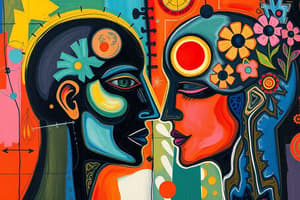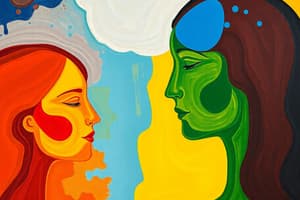Podcast
Questions and Answers
What is the primary focus of B.F. Skinner's theories?
What is the primary focus of B.F. Skinner's theories?
- The development of identity through social relationships
- The impact of ecological systems on human growth
- Observable behaviors shaped by reinforcement and punishment (correct)
- Cognitive development and social interaction
Which key concept is associated with Urie Bronfenbrenner's ecological systems theory?
Which key concept is associated with Urie Bronfenbrenner's ecological systems theory?
- Understanding microsystem, mesosystem, and macrosystem (correct)
- Conflicts in personality development
- The role of learned behaviors in social contexts
- The importance of punishment in learning
What does Albert Bandura emphasize in his social cognitive theory?
What does Albert Bandura emphasize in his social cognitive theory?
- The influence of environmental factors on personality development
- Behavior changes and learning through observation (correct)
- The role of genetic predispositions in behavior
- How behavior can be conditioned through rewards
In Erik Erikson's theory, how do individuals develop their personality?
In Erik Erikson's theory, how do individuals develop their personality?
Which statement best describes the method used by B.F. Skinner?
Which statement best describes the method used by B.F. Skinner?
What is the main focus of B.F. Skinner's theory?
What is the main focus of B.F. Skinner's theory?
How many stages are there in Erik Erikson's psychosocial development theory?
How many stages are there in Erik Erikson's psychosocial development theory?
Which aspect is a key component of Urie Bronfenbrenner's ecological systems theory?
Which aspect is a key component of Urie Bronfenbrenner's ecological systems theory?
What does Albert Bandura’s social cognitive theory primarily explore?
What does Albert Bandura’s social cognitive theory primarily explore?
What is a key outcome of the positive reinforcement example given for dog training?
What is a key outcome of the positive reinforcement example given for dog training?
Which of the following best describes Erikson's view on personality development?
Which of the following best describes Erikson's view on personality development?
What role does parental involvement play according to Bronfenbrenner's theory?
What role does parental involvement play according to Bronfenbrenner's theory?
Which of the following terms relates to Erikson's emphasis on building independence?
Which of the following terms relates to Erikson's emphasis on building independence?
What are the five stages of Sigmund Freud's psychosexual development theory?
What are the five stages of Sigmund Freud's psychosexual development theory?
How does Jean Piaget's theory view children's involvement in their learning?
How does Jean Piaget's theory view children's involvement in their learning?
What is the primary focus of Lev Vygotsky's Child Development Theory?
What is the primary focus of Lev Vygotsky's Child Development Theory?
What exemplifies Erik Erikson's Psychosocial Development Theory's approach?
What exemplifies Erik Erikson's Psychosocial Development Theory's approach?
Which aspect is NOT emphasized by Freud's theory of psychosexual development?
Which aspect is NOT emphasized by Freud's theory of psychosexual development?
What is a key concept in Vygotsky's theory regarding social interaction?
What is a key concept in Vygotsky's theory regarding social interaction?
Which theorist proposed a stage that includes 'Genital' as one of the final phases?
Which theorist proposed a stage that includes 'Genital' as one of the final phases?
What does Erik Erikson's theory primarily address?
What does Erik Erikson's theory primarily address?
Flashcards
Radical Behaviorism (B.F. Skinner)
Radical Behaviorism (B.F. Skinner)
A theory that focuses on observable behaviors and how they are shaped by reinforcement and punishment. It emphasizes the environment's role in shaping behavior.
Ecological Systems Theory (Urie Bronfenbrenner)
Ecological Systems Theory (Urie Bronfenbrenner)
A theory explaining human development as a complex interaction between individuals and different environmental systems, including family, school, and culture.
Social Cognitive Theory (Albert Bandura)
Social Cognitive Theory (Albert Bandura)
A theory that emphasizes how individuals learn from observing and imitating others. It also considers personal factors and environmental influences that shape behavior.
Psychosocial Development (Erik Erikson)
Psychosocial Development (Erik Erikson)
Signup and view all the flashcards
Social Cognitive Theory (Albert Bandura)
Social Cognitive Theory (Albert Bandura)
Signup and view all the flashcards
Freud's Psychosexual Stages
Freud's Psychosexual Stages
Signup and view all the flashcards
Piaget's Cognitive Development Stages
Piaget's Cognitive Development Stages
Signup and view all the flashcards
Vygotsky's Sociocultural Theory
Vygotsky's Sociocultural Theory
Signup and view all the flashcards
Erikson's Psychosocial Stages
Erikson's Psychosocial Stages
Signup and view all the flashcards
Freud's Oral Stage
Freud's Oral Stage
Signup and view all the flashcards
Freud's Anal Stage
Freud's Anal Stage
Signup and view all the flashcards
Freud's Phallic Stage
Freud's Phallic Stage
Signup and view all the flashcards
Freud's Latent Stage
Freud's Latent Stage
Signup and view all the flashcards
Erikson's Psychosocial Development Theory
Erikson's Psychosocial Development Theory
Signup and view all the flashcards
Radical Behaviorism
Radical Behaviorism
Signup and view all the flashcards
Reinforcement and Punishment
Reinforcement and Punishment
Signup and view all the flashcards
Ecological Systems Theory
Ecological Systems Theory
Signup and view all the flashcards
Microsystem
Microsystem
Signup and view all the flashcards
Mesosystem
Mesosystem
Signup and view all the flashcards
Macrosystem
Macrosystem
Signup and view all the flashcards
Social Cognitive Theory
Social Cognitive Theory
Signup and view all the flashcards
Study Notes
Sigmund Freud
- Created the theory of psychosexual development
- 5 stages: Oral, Anal, Phallic, Latent, Genital
- The phases can shape their personalities later on from when they were a baby.
- He was a psychoanalyst or not, if they are successful or not.
- Explores unconscious minds in dreams.
- Considered to have made a huge impact on sexual behaviors and influences our behaviors as adults.
Jean Piaget
- His theory was to argue we have 4 stages of cognitive development: sensory-motor, preoperational, concrete operational and lastly formal operational stage.
- At last stage we can reach full human development.
- Emphasized active role of children in contracting their own knowledge through interaction with the environment.
- Considered an influential developmental psychologist of the intellectual development of human beings.
Lev Vygotsky
- Vygotsky's Child Development Theory
- Highlights of cultural and communication in child development.
- Community and language play a central learning part for children.
- Elementary mental functions with attention, sensation, perception and memory.
- Social interaction is fundamental role in cognition development to be able to learn more to reach their full capability.
Erik Erikson
- Believes personality development persists beyond five years.
- Personality is influenced by trust, autonomy, intimacy, integrity, and identity.
- Uses neo-Freudian ideas with his own ideas.
- 8 stages of psychosocial development.
B.F. Skinner
- His major point of view was radical behaviorism, which the study of observable behavior.
- Helps understand behaviors are shaped by reinforcement and punishment.
- He focused on behavior and how environmental factors shape it.
- His approach is often used by behaviorism rather than a personality or social theory.
Urie Bronfenbrenner
- Urie was a developmental psychologist known for his ecological systems theory, which is human development as interaction with a person and environmental systems.
- Emphasizes the importance of ecological systems, microsystem, mesosystem and macrosystem.
- He is known for understanding children's potential.
Studying That Suits You
Use AI to generate personalized quizzes and flashcards to suit your learning preferences.




